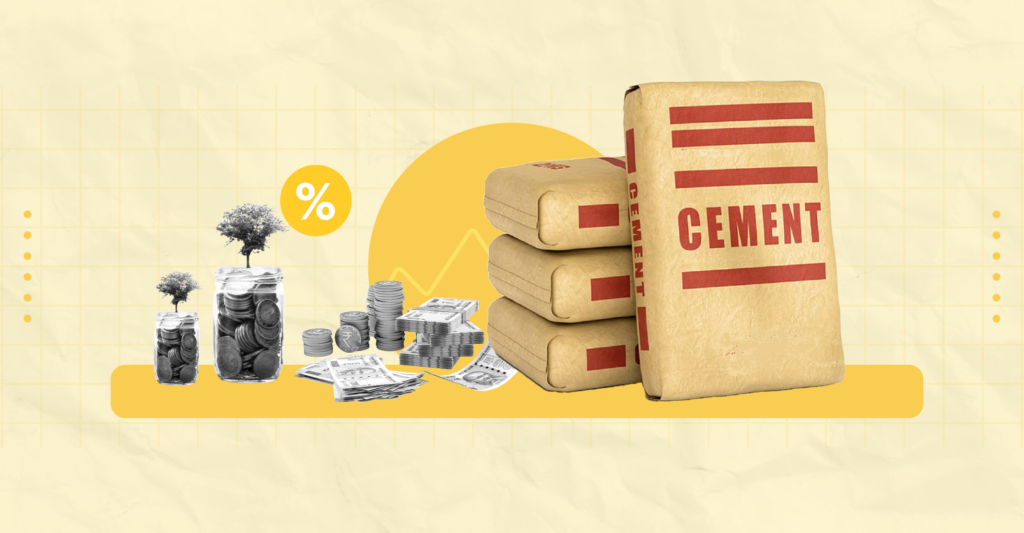Last Updated on Oct 30, 2024 by Vanessa Sequeira
The Indian cement industry has come a long way from its humble beginnings post-independence. The government’s emphasis on infrastructure and housing catalysed the growth of cement production. By the 1980s, the liberalisation of the sector opened doors for private investments, leading to a boom. As a result, large players in cement stocks like ACC, Ultratech, and Ambuja Cement emerged, dominating the market with their robust capacities and extensive distribution networks. Mergers and acquisitions also played a pivotal role, with Ultratech becoming the largest cement producer in India after acquiring major players like Jaypee Cement.
Today, India is not just self-sufficient in cement production; it’s a major exporter as well. The sector has become a vital contributor to India’s GDP, employing millions and supplying the backbone for infrastructure projects. In this blog, we’ll dive into the top 10 cement stocks in India that stand tall, offering both stability and potential in a growing market.
Table of Contents
Best Cement Stocks Listed on NSE
Top 10 Cement Stocks in India – Based on the Market Cap
| Name | Market Cap (Rs. in cr.) | Close Price (Rs.) | PE Ratio |
| UltraTech Cement Ltd | 3,11,984.90 | 10,869.30 | 44.54 |
| Grasim Industries Ltd | 1,78,135.28 | 2,655.35 | 31.67 |
| Ambuja Cements Ltd | 1,37,565.45 | 558.50 | 38.46 |
| Shree Cement Ltd | 88,161.14 | 24,434.40 | 36.80 |
| ACC Ltd | 42,183.59 | 2,246.35 | 18.06 |
| Dalmia Bharat Ltd | 33,842.03 | 1,804.45 | 40.97 |
| J K Cement Ltd | 32,492.84 | 4,205.20 | 41.09 |
| Ramco Cements Limited | 19,537.84 | 826.85 | 54.28 |
| Nuvoco Vistas Corporation Ltd | 12,007.59 | 336.20 | 81.48 |
| RHI Magnesita India Ltd | 11,929.59 | 577.70 | -118.75 |
Note: The list of top cement stocks is derived from Tickertape Stock Screener as of 23 October 2024 and filtered using the following parameters
- Sector – Cement
- Market Cap – Sort from highest to lowest
Overview of Top Cement Stocks in India
UltraTech Cement Ltd
UltraTech Cement Ltd is the largest cement producer in India, recognised for its expansive network and diverse product range. Over the last 5 years, it has achieved an annual revenue growth rate of 11.2%, outperforming the industry average of 9.51% as of 25 October 2024. Additionally, it maintains a debt-to-equity ratio of 33.95%, significantly lower than the industry average of 58.37%.
Grasim Industries Ltd
Grasim Industries Ltd operates in both the cement and textiles segments and is a key player in the cement market through its subsidiary, UltraTech Cement. Grasim’s revenue has grown at a yearly rate of 11.13% over the past 5 years, with its market share rising from 33.05% to 33.53% as of 25 October 2024.
Ambuja Cements Ltd
Ambuja Cements Ltd is known for its sustainable building solutions and strong market reputation. It boasts a return on equity (ROE) of 7.98% and a net profit margin of 10.35%, reflecting its focus on profitability and efficient operations as of 25 October 2024.
Shree Cement Ltd
Shree Cement Ltd has earned a reputation for efficiency and cost management. It has posted a revenue growth rate of 10.53% annually over the last 5 years, while maintaining a low debt-to-equity ratio of 14.59%, well below the industry average of 58.37% as of 25 October 2024.
ACC Ltd
ACC Ltd is a market leader with a broad portfolio of cement products. It is expected to deliver a return of 25.54% from current price levels, surpassing its 3-year compound annual growth rate (CAGR) of 12.26% as of 25 October 2024. The company also enjoys a healthy ROE of 15.33%.
Top 10 Cement Stocks in India – Based on the Net Profit Margin
| Name | Market Cap (Rs. in cr.) | Close Price (Rs.) | PE Ratio | Net Profit Margin (%) |
| Pokarna Ltd | 3,099.00 | 999.55 | 35.47 | 12.50 |
| Shree Cement Ltd | 88,161.14 | 24,434.40 | 36.80 | 11.34 |
| ACC Ltd | 42,183.59 | 2,246.35 | 18.06 | 11.29 |
| Shree Digvijay Cement Co Ltd | 1,350.98 | 91.65 | 15.39 | 10.95 |
| Ambuja Cements Ltd | 1,37,565.45 | 558.50 | 38.46 | 10.35 |
| Star Cement Ltd | 8,017.73 | 198.37 | 27.17 | 10.05 |
| UltraTech Cement Ltd | 3,11,984.90 | 10,869.30 | 44.54 | 9.79 |
| Shri Keshav Cements and Infra Ltd | 367.68 | 216.90 | 40.23 | 7.09 |
| Ramco Industries Ltd | 2,095.05 | 241.34 | 19.82 | 6.97 |
| Heidelbergcement India Ltd | 5,126.67 | 226.23 | 30.56 | 6.93 |
Note: The list of top cement stocks is derived from Tickertape Stock Screener as of 23 October 2024 and filtered using the following parameters
- Sector – Cement
- Net Profit Margin – Sort from highest to lowest
Top 10 Cement Stocks in India – Based on Return on Equity
| Name | Market Cap (Rs. in cr.) | Close Price (Rs.) | PE Ratio | Return on Equity (%) |
| Shree Digvijay Cement Co Ltd | 1,350.98 | 91.65 | 15.39 | 24.85 |
| SP Refractories Ltd | 32.26 | 180.25 | 20.81 | 15.95 |
| Pokarna Ltd | 3,099.00 | 999.55 | 35.47 | 15.89 |
| J K Cement Ltd | 32,492.84 | 4,205.20 | 41.09 | 15.88 |
| ACC Ltd | 42,183.59 | 2,246.35 | 18.06 | 15.33 |
| JK Lakshmi Cement Ltd | 9,204.15 | 782.20 | 19.51 | 15.23 |
| UltraTech Cement Ltd | 3,11,984.90 | 10,869.30 | 44.54 | 12.22 |
| Shree Cement Ltd | 88,161.14 | 24,434.40 | 36.80 | 12.15 |
| Shri Keshav Cements and Infra Ltd | 367.68 | 216.90 | 40.23 | 12.10 |
| Prism Johnson Ltd | 9,315.12 | 185.06 | 51.43 | 11.60 |
Note: The list of top cement stocks is derived from Tickertape Stock Screener as of 23 October 2024 and filtered using the following parameters
- Sector – Cement
- Return on Equity – Sort from highest to lowest
Top 10 Cement Stocks in India – Based on 5-yr CAGR
| Name | Market Cap (Rs. in cr.) | Close Price (Rs.) | PE Ratio | 5Y CAGR (%) |
| Andhra Cements Ltd | 771.02 | 83.65 | -11.75 | 100.22 |
| Pokarna Ltd | 3,099.00 | 999.55 | 35.47 | 44.31 |
| Burnpur Cement Ltd | 55.12 | 6.40 | -0.56 | 40.96 |
| Shree Digvijay Cement Co Ltd | 1,350.98 | 91.65 | 15.39 | 40.57 |
| Shri Keshav Cements and Infra Ltd | 367.68 | 216.90 | 40.23 | 39.40 |
| Barak Valley Cements Ltd | 120.24 | 54.26 | 16.54 | 36.50 |
| India Cements Ltd | 11,165.60 | 360.30 | -49.11 | 35.36 |
| Shiva Cement Ltd | 1,240.77 | 42.06 | -18.16 | 34.36 |
| Orient Cement Ltd | 7,039.29 | 343.60 | 40.26 | 33.09 |
| Navkar Urbanstructure Ltd | 263.24 | 11.73 | 258.08 | 30.92 |
Note: The list of top cement stocks is derived from Tickertape Stock Screener as of 23 October 2024 and filtered using the following parameters
- Sector – Cement
- 5-yr CAGR – Sort from highest to lowest
Cement is a critical component of the construction sector, providing the building blocks for everything from homes and commercial buildings to infrastructure projects such as roads, bridges, and dams. The cement industry is one of India’s important industries, contributing 7% of the world’s cement capacity. As a result, many investors are also interested in the top 20 cement companies in India with share price comparisons to help decide which is the best cement stock to invest in India.
How to Invest in Cement Stocks
Here’s a step-by-step guide on how to invest using platforms like Tickertape to search for the best cement stock to invest in India:
Step 1: Create an Account on Tickertape
Begin by creating an account on Tickertape to access a suite of tools and resources to analyse and track cement stocks. Whether you’re looking for top ten cement in India 2024 or cement penny stocks India, this platform offers a wide array of options to filter and study.
Step 2: Use the Stock Screener
Utilise Tickertape’s Stock Screener to filter cement stocks based on key parameters such as revenue growth, profitability, market share, and valuation ratios like P/E and EV/EBITDA. Customise your filters to identify stocks that align with your investment objectives. For a more comprehensive analysis, explore Tickertape Pro, which unlocks access to 60+ custom filters and advanced forecasts, giving you an in-depth view of the stock market like never before.
Step 3: Analyse Selected Cement Stocks
Once you have shortlisted top cement shares in India or the top 20 cement companies in India with share price, conduct a deeper analysis. Examine financial statements, production capacities, debt levels, and overall industry outlook. Leverage expert analyses and industry reports available on Tickertape to gauge the growth potential of each company.
Step 4: Create a Diversified Portfolio
Diversification can mitigate risks inherent in investing in a single sector. Consider including cement stocks across large-cap, mid-cap, and small-cap segments to balance your portfolio. For more aggressive investors, adding cement penny stocks in India can offer higher returns, while more cautious investors may look for the best cement stock to invest in India.
Step 5: Monitor Your Investments
Regularly monitor your investments using Tickertape’s portfolio tracking tools. Keep a close watch on industry developments, government policy changes, and market trends that may impact green cement stocks in India. Keep up with the top ten cement in India 2024 rankings and check for any fluctuations.
Step 6: Review and Rebalance
Periodically review your portfolio to ensure it aligns with your financial goals. Rebalance your investments if needed to maintain the desired allocation, especially when market conditions shift or significant changes occur in the cement industry. Whether your focus is on penny stocks in the cement industry or more established cement stocks, staying up-to-date with industry trends is crucial.
Advantages of Investing in Cement Stocks
Here are some of the reasons why cement stocks, particularly the best small cap cement stocks and those from the top cement companies in India by market share, could be valuable additions to your investment portfolio.
1. Strong Demand Backed by Infrastructure Growth: Urbanisation and industrial growth fuel demand, providing a stable foundation for cement stocks to perform well over the long term. As the infrastructure boom continues, investing in the best cement stocks to buy today may benefit you from this upward trend.
2. Diversification Within the Cement Sector: While large-cap cement companies dominate the industry, small cap cement stocks present unique growth opportunities. These companies may not yet be at the top in terms of market share, but they have the potential to expand rapidly and deliver significant returns to investors.
3. Solid Earnings and Dividend Potential: Many of the best cement stocks to buy in India for long-term investments display solid financials and consistent earnings. As you look through a cement stocks screener, pay attention to companies with a healthy balance sheet and consistent dividend history.
4. Long-Term Investment Potential: The demand for cement is projected to grow steadily in the coming decades due to ongoing infrastructure projects and urban expansion. Hence, the best cement shares to buy now can provide sustained growth over time.
Risks of Investing in Cement Stocks
Here are some of the key risks to consider when investing in the top cement stocks in India or exploring which cement share is best in India for your portfolio.
1. Cyclical Nature of the Industry: During periods of economic slowdown or reduced government spending on infrastructure, demand for cement can drop significantly. This can affect the performance of even the best cement shares to buy in India, leading to volatility in stock prices and company earnings.
2. Fluctuating Raw Material Costs: Even the best cement share for long term investment may face short-term challenges due to rising material costs, which are often outside the control of the company.
3. Regulatory and Environmental Challenges: As countries, including India, tighten environmental standards, cement companies may face additional costs related to compliance, pollution control, and sustainability initiatives. These regulatory pressures can affect the profitability of even the top cement stocks in India.
4. High Competition and Market Saturation: Established companies dominate the landscape, making it difficult for newer or smaller players to gain significant traction. For investors considering which cement share to buy, it’s crucial to recognise that market saturation can limit the growth potential of smaller players.
5. Risks with Penny Stocks in the Cement Industry: While best cement penny stocks can offer high growth potential, these stocks typically belong to smaller companies with less financial stability. Investing in penny stocks in the cement industry requires careful consideration, as these stocks are vulnerable to market fluctuations
6. Geopolitical and Economic Risks: A slowdown in government infrastructure projects or changes in trade regulations can affect cement sales. Even the best cement shares to buy may underperform due to broader macroeconomic issues beyond the company’s control.
Growth of the Indian cement industry
When you look at the Indian cement industry’s place in the world, our country stands as the 2nd largest cement producer globally and the 3rd largest consumer. Amid global uncertainties and rising inflation, the Union Budget 2024-25 stands out as transformative and future-oriented, with a clear focus on fiscal consolidation. The allocation of INR 11 lakh crore for capital expenditure underscores the Government’s dedication to modernising India’s infrastructure through key projects and investments.
This significant commitment is poised to boost demand for the cement sector in India and other construction materials, reflecting the budget’s comprehensive and strategic vision for strengthening infrastructure across multiple sectors. In India, cement consumption is expected to reach 550–600 MT by 2025, driven mainly by the massive need for commercial, industrial and residential development.
Future of Cement Stocks in India
With the increase in population, the demand for housing commercial and industrial buildings keeps increasing. Even the Government of India has several developments planned concerning infrastructure and housing projects like PM Awas Yojana. This shows that the demand for cement is never-ending. However, as an investor, it’s crucial to consider not just the overall growth of the industry but also the individual performance of companies. For those interested in cement companies stock, it’s essential to align investment objectives with risk appetite.
Factors Affecting the Best Cement Share Prices
- Economic growth: Cement industry shares are closely tied to the overall economic health of a country. As infrastructure development and construction activities increase with economic growth, the demand for cement rises. This, in turn, boosts the share prices of cement companies, particularly those listed in the India cement company list.
- Government policies and infrastructure spending: Government initiatives aimed at enhancing infrastructure, such as roads, buildings, and bridges, directly impact the cement sector in india. Increased public spending on infrastructure projects can positively influence the best cement stocks to buy in India for long-term returns.
- Input costs: The price of raw materials (like limestone, coal, and power) necessary for cement production significantly affects the profitability of cement companies. Any fluctuations in these costs directly affect cement companies stock prices, including midcap cement stocks.
- Housing and real estate sector performance: The health of the housing and real estate sectors is a crucial demand driver for the cement industry. A booming real estate sector translates to increased cement consumption. This leads to a higher cement market share in India and contributing to the value of all cement share price fluctuations.
- Environmental regulations: Cement manufacturing is energy-intensive and contributes significantly to carbon emissions. Stricter environmental regulations and policies aimed at reducing carbon footprints can increase operational costs for cement companies, affecting their profitability and, consequently, their share prices. Conversely, companies that invest in sustainable practices may gain a competitive edge and investor preference, positively impacting their share prices.
Factors to Consider While Investing in Cement Stocks
Though cement is one of the essential sectors in India, there are certain things you need to consider while investing in cement sector stocks.
- Economic and political stability in the country.
- The competitive landscape of the industry, including the market share and pricing power of major players.
- Raw material availability and cost.
- The regulatory environment, including environmental regulations and labour laws.
- The financial health and management of individual companies.
Evaluating these factors gives a clearer understanding of whether a stock is worth investing in. Many investors look to undervalued cement stocks for higher growth potential, while others focus on the best small-cap cement stock or midcap cement stocks. Additionally, platforms like Tickertape allow investors to track the cement company list, view the cement product list, and analyse cement market share in India to make informed decisions.
When you check all these factors, you clearly understand which is the best cement share to buy now. To analyse a stock better, use Tickertape Scorecard. The Scorecard feature gives you a good picture of the stock’s performance, growth, profitability and, most importantly, red flags associated with it.
Go to individual asset pages and analyse your favourite stock using the Scorecard.
Conclusion
Overall, the cement industry is one of India’s key industries. For investors aiming to diversify, considering a list of cement companies in India along with the all cement name list helps in building a balanced portfolio. Whether you’re interested in undervalued cement stocks or all cement share price data, making informed decisions based on thorough analysis is key. Conduct your research, use Tickertape’s Stock Screener to find the best cement stocks to buy in India, and watchlist your favourite stocks and invest accordingly.
What are the top cement stocks in NSE?
The top cement companies in the NSE are
– UltraTech Cement Ltd
– Grasim Industries Ltd
– Ambuja Cements Ltd
– Shree Cement Ltd
– ACC Ltd
These are as of 25th October 2024, derived using Tickertape Stock Screener and sorted according to the Market Cap.
What are the best small-cap cement stocks in India?
The best smallcap cement stocks in India are,
– Ramco Cements Ltd
– Nuvoco Vistas Corporation Ltd
– RHI Magnesita India Ltd
– India Cements Ltd
– Prism Johnson Ltd
These are as of 25th October 2024, derived using Tickertape Stock Screener and filtered as per the following parameters,
– Sector: Cement
– Market Cap: Smallcap – Sort from highest to lowest
What are the top penny cement stocks in India?
The top cement penny stocks in India are:
– Navkar Urbanstructure Ltd
– Oriental Trimex Ltd
– Burnpur Cement Ltd
– Binani Industries Ltd
– Mega Nirman & Industries Ltd
Please note that these stocks are priced at below Rs. 20 as of 25th October 2024.
Is the cement sector profitable?
The cement industry is highly competitive and capital-intensive, often yielding lower profit margins compared to other sectors, typically around 5-10% of revenue. However, profitability can differ widely across regions in India due to factors like local demand, regulatory policies, and the availability of raw materials.
What key factors should I consider when evaluating the financial performance of cement stocks before investing?
To analyse the financial performance of cement sector stocks, focus on key metrics like revenue growth, EBITDA margin and debt-to-equity ratio. Additionally, consider cash flow generation and return on equity (ROE) to gauge overall profitability and financial health.
- Top 10 High-Return Mutual Funds in India (2024) - Nov 19, 2024
- Where to Invest Money in India? 15 Investment Options to Explore - Nov 18, 2024
- Best Long Term Stocks to Buy in NSE India for 2024 - Nov 18, 2024




